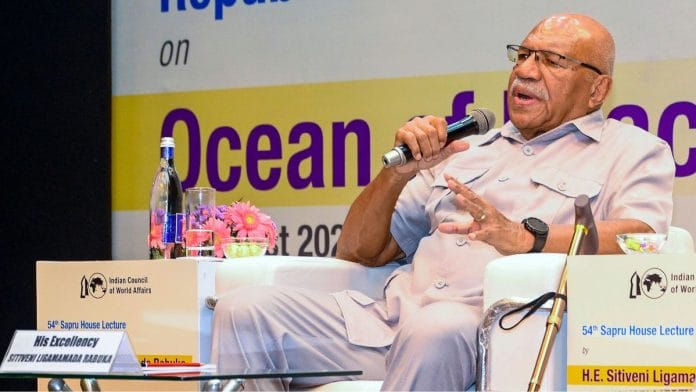New Delhi: “India is an important partner in Fiji’s effort to promote a peaceful and united Pacific region,” Fijian Prime Minister Sitiveni Ligamamada Rabuka said in New Delhi Tuesday.
With respect to the 50 percent tariff imposed by the US on Indian goods, Rabuka expressed confidence in Prime Minister Narendra Modi’s ability to navigate international pressure, saying that his Indian counterpart possesses the strength to withstand such challenges.
“The recent announcements of the tariffs by the United States… I told him (PM Modi) the other day, somebody is not very happy with you but you’re big enough to weather those discomforts,” he remarked.
Speaking at an event organised by the Indian Council of World Affairs, which was part of his three-day state visit to India from 24 August to 26 August, Rabuka laid out an expansive vision for the “Ocean of Peace”—a strategic and moral framework aimed at ensuring regional stability, environmental stewardship, and cooperative diplomacy across the vast Pacific.
“India is an important partner,” Rabuka said, noting India’s support in areas such as digital infrastructure, healthcare, renewable energy, education and skill training. He added that India can amplify Fiji’s voice in multilateral forums, like the United Nations, and support the Pacific’s calls for climate justice, nuclear disarmament and respect for international law.
With over 32 million square kilometres of ocean under sovereign jurisdiction, the Pacific nations hold significant geopolitical weight, and “only slightly smaller than the combined land areas of Russia, China and the United States”, according to Rabuka.
The “Ocean of Peace” concept, which the Fijian PM has championed throughout the decade, proposes a 12-principle framework based on Pacific regionalism. Among its pillars are the rejection of coercion, commitment to international law, respect for human rights, environmental protection, and nuclear non-proliferation. Crucially, it emphasises dialogue and consensus—what Rabuka called the “Pacific Way”—as tools to manage strategic competition in the Indo-Pacific.
He warned, however, that peace in the Pacific remains fragile, citing threats ranging from geopolitical tensions and military competition, to the existential dangers of climate change. “The Blue Pacific has been a theater of external wars,” he said, “a testing ground for the most dangerous weapons, and now it faces catastrophic calamities driven by climate change.”
He expressed concern over eroding multilateral norms and the rising uncertainty in global economic and political systems. He said that Fiji would continue to advocate for a balanced, non-aligned posture in global affairs, promoting regional equilibrium and prioritising Pacific-led solutions to Pacific problems.
Rabuka’s remarks come just weeks before Pacific Island Forum leaders are set to convene in Manila, Solomon Islands, where the draft Ocean of Peace declaration now passed through internal forums and ministerial meetings is expected to be formally considered.
“Our most significant contribution,” Rabuka said, “is to create in the homeland, home area of our peacekeepers, the peace we already feel at home and to take it abroad.”
He urged India and other international partners to embrace and support the “Ocean of Peace” initiative, not only as a regional commitment, but as a global model for conflict resolution and sustainable coexistence. “Together, we can make this vision not only a regional reality, but a global contribution to peace and the dignity of humankind,” he said.
(Edited by Mannat Chugh)
Also Read: India to set up defence wing in Fiji to boost Pacific presence amid China’s growing footprint






